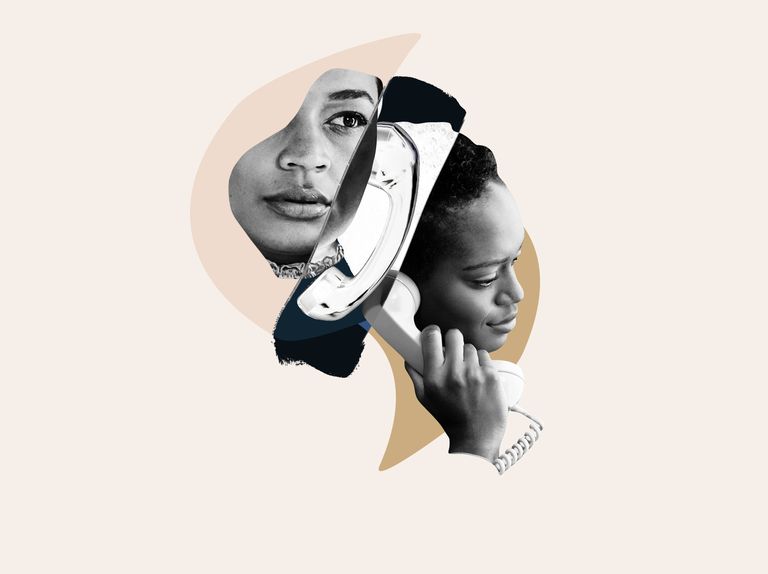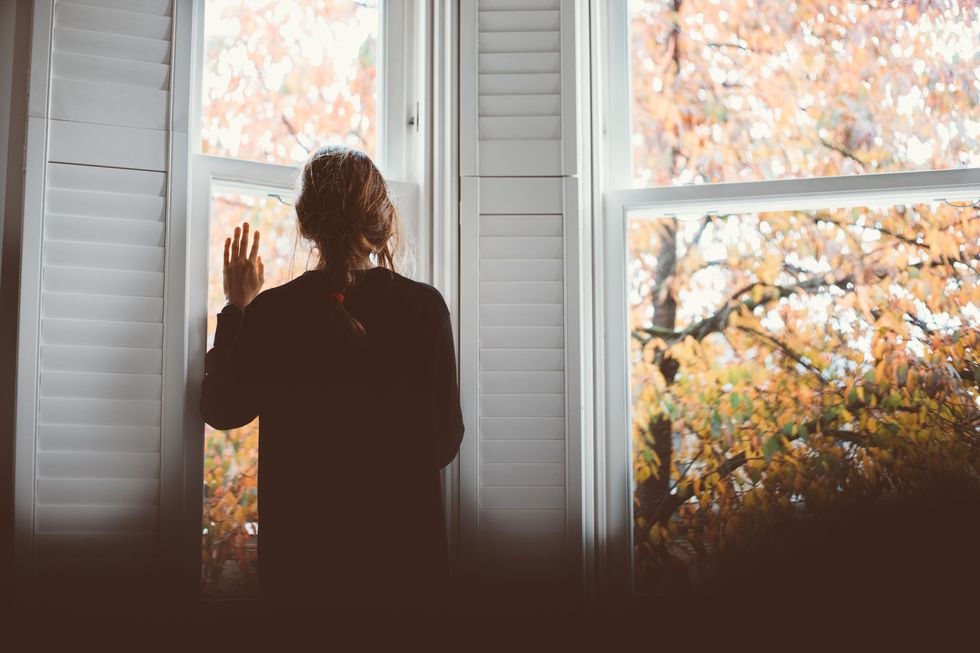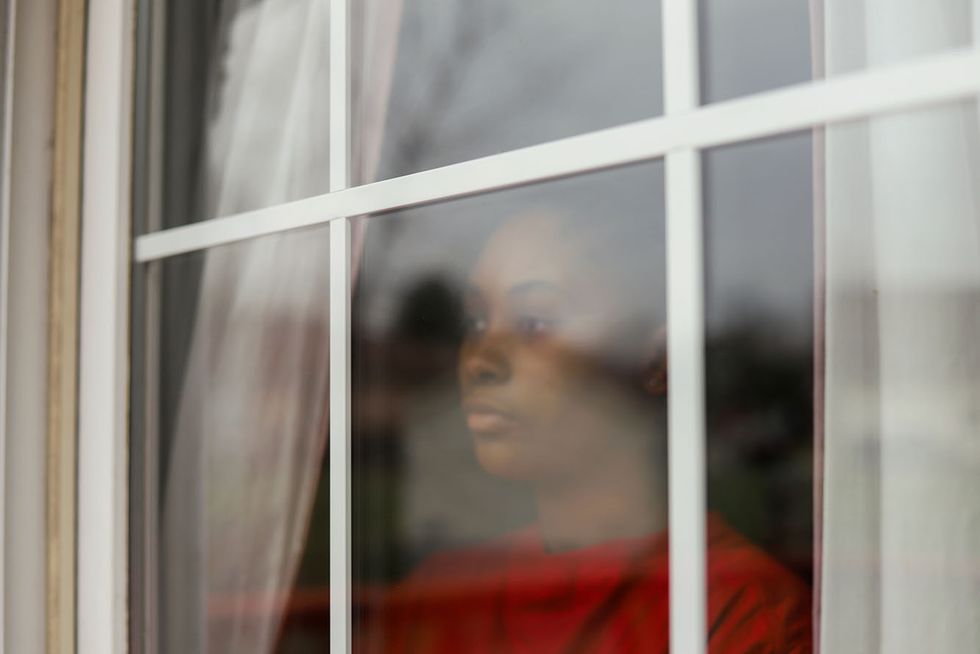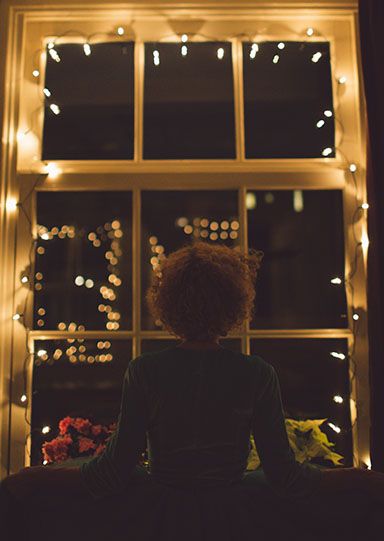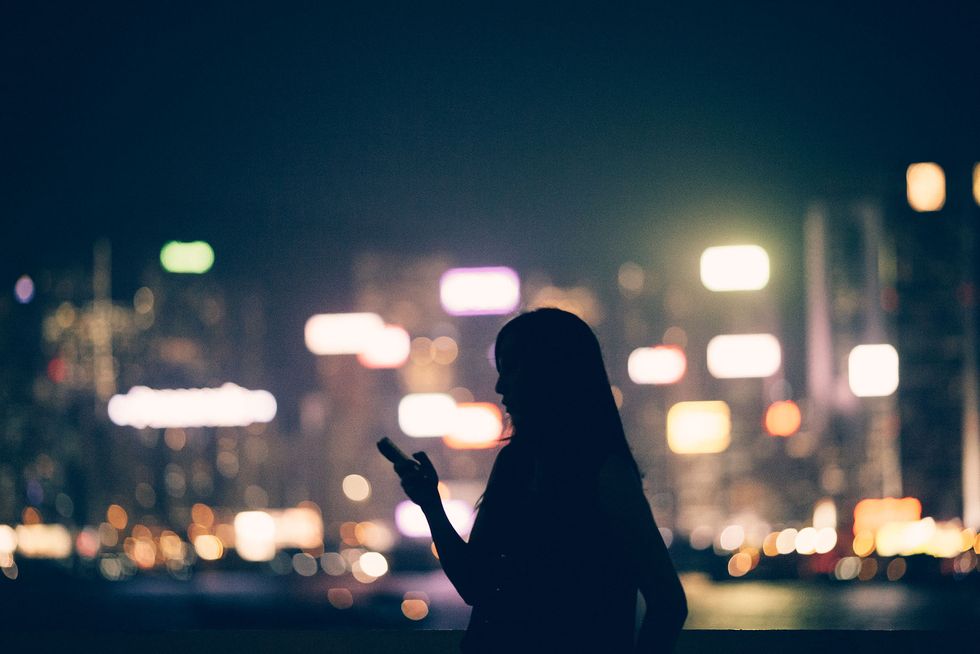It’s 3am and Sophie has arrived for her shift. Pulling up the sleeves of her hoodie, she enters a terraced house in the middle of West Sussex and flicks on the kettle in the kitchen. With an arsenal of hot coffee and an individually-wrapped KitKat – the days of burrowing into the team’s communal biscuit tin have long gone – she walks into the adjacent room and slides into her chair. Separated by a wall of Perspex from the gentleman sat beside her, she’s alone. Still.
With the precision of a theatre nurse, the 28-year-old gently wipes down her equipment – a computer, phone, pen, notepad and desk – with an antibacterial wipe. The aroma of arabica beans diffusing from her mug mingles with the sharp tang of alcohol gel. After logging into the computer system, a multitude of tiny red dots flash up on her phone’s display like a festoon of twinkling Christmas lights. Each one represents merely a fraction of the thousands of callers waiting for a voice – any voice – in the dead of the night. Drawing back her shoulders, she slowly picks up her handset and exhales. It’s time.
This is a scene that plays out in over 200 Samaritan branches across the UK and Ireland, 24/7, 365 days a year as volunteers respond to calls. The Samaritans’ logo – white font on a soft green background – is a familiar sight; it pops up at train stations, on T-shirts at charity runs and on TV screens during the festive period. It’s a stark reminder of the loneliness and mental ill-health people suffer, and the importance of a listening ear in times of need. But never have the Samaritans been in a more vital service, than in the last 18 months.
Same storm, different boats
When the UK went into lockdown on March 23, 2020, many of us feared the weeks (and, later months) of solitude and financial strain that could lie ahead. In the beginning, communities united in wartime solidarity. Friends and families checked in on each other via Zoom. Volunteers collected prescriptions for the elderly. A cacophony of banged pots and applause echoed through the streets on Wednesdays. Before long, Netflix series, afternoon walks and freshly baked sourdough became the favoured tonic for remedying dark days. And yet it's safe to say that not one of us will come out through the health crisis unbruised by Covid-19’s heavy blow.
According to ONS figures, one in five adults were likely to have experienced depression by June 2020 – double the number from the previous year. Meanwhile, a quarter of adults and young people who tried to access mental health support were unable to do so. If that wasn’t worrying enough, the pandemic came at a time when suicide rates in females under 25 had already increased 93.8% between 2012 and 2019. ‘The stresses and strains are beginning to take its toll,’ Prime Minister Boris Johnson said of the Covid-19’s effect on our mental health in February.
Knowing this, it might not surprise you that in the year since restrictions began, the Samaritans were contacted a staggering 2.3 million times. But while hindsight makes things obvious, at the time, the demand for the Samaritans' services was overwhelming. ‘I genuinely didn't think it would be busy all the time,’ Sophie, who qualified as a listening volunteer last year, tells ELLE UK.
For Lyndsey, 34, a Samaritan from Worthing, it wasn’t so much the volume of calls she received that became a challenge, but rather it was balancing callers’ concerns with her own. ‘We’re all in the same storm, but sat in different boats,’ she says. ‘When you're feeling scared about exactly the same things that the caller is feeling terrified about, it’s quite a different experience.’
Like most people during lockdown, Lyndsey admits she became a dab hand at multi-tasking, fitting Samaritan shifts around a full-time job and caring for her six-year-old son. However, the early weeks of lockdown reminded her of the time she herself called the Samaritans, after struggling to cope during her maternity leave. ‘My son must have been about seven-months-old and I was in the depths of crappy newborn life and no sleep,’ she recalls. ‘I was in tears talking to my husband in the evenings telling him that I was a rubbish mum and that my son deserved so much better. The Samaritan I spoke to listened to how I felt and was 100% with me in that moment.’
Confined to working from home with a young child and exhausted from Samaritan shifts, Lyndsey says the first phase of lockdown felt all too familiar. ‘It felt like I was on maternity leave again and took me back to that really horrible place of, “I don't want to be here”,’ she says. As a result, the Samaritans became as much of a lifeline for her as it is for callers. ‘My volunteer shifts meant that, at least once a week, I could get out of the house,’ she says.
When discussing the calls volunteers received over the last 18 months, everyone agrees that some of the most challenging discussions have been with NHS workers. At the beginning of the pandemic, almost half of UK doctors (45%) reported experiencing depression, anxiety, stress, burn-out or other mental health conditions, while one study found that nearly one in five nurses working in ICUs had thoughts of self-harm or suicide. ‘NHS and care staff are breaking down,’ shadow minister for mental health, Rosena Allin-Khan, wrote to Matt Hancock, former Secretary of State for Health and Social Care, last May.
For Samaritan Leonie, 32, from Huddersfield, conversations with medical staff about the emotional and physical toll they faced were particularly penetrating. ‘It really brought home how people are struggling in our national health service,’ she says.
Meanwhile, for Lyndsey it was during a shift last April - in which she spoke to an NHS worker and somebody receiving medical treatment - that exposed the polarised views of the pandemic and frontline staff’s work. ‘They had totally different perspectives [on the situation],’she recalls. ‘It was really tricky switching between the two mindsets and treating them in a non-judgemental way while also appreciating their individual views and experiences,’ she says.
An escape from loneliness
Before the pandemic, you’d be forgiven for assuming it would be the elderly suffering most from isolation (images of Carl Fredricksen from Pixar’s 2009 animation Up spring to mind). But research now shows that young people are faring worse, with one study finding that almost half of young people reported feeling lonely after almost a year of lockdown restrictions, compared to a third at the beginning. According to the Samaritans, loneliness and isolation were a concern in 29% of emotional support contacts during the 12 months since restrictions began.
‘A lot of younger people have said that they’re living on their own, haven’t spoken to anyone in the day or that their friends and family are miles away,’ says Sophie, who knows all too well the vital companionship the Samaritans can provide. In her early twenties she contacted the organisation via email after a car accident and the breakdown of her marriage, which resulted in her spending many nights wide awake with no one to talk to. ‘It breaks my heart when [callers] say “This is the first time I've spoken to somebody today.”’
More than any other time of the year, the festive period is extraordinarily tough for Samaritans and callers alike. ‘Some callers told us the winter lockdowns felt lonelier and more isolating than earlier ones,’ says Mette Isaksen, Senior Research and Evidence Manager at Samaritans. ‘Concerns about catching the virus became more common again, alongside ongoing worries about the financial, social and mental health impacts of restrictions…. There was also uncertainty and hopelessness about the future.’
These were worries Sophie heard first-hand during her Christmas and New Year’s Day shifts. ‘People were struggling not being able to see friends, but also being hard on themselves thinking they hadn’t “achieved” anything in the 12 months prior,’ she explains. While usually she's able to ‘switch off’ after a shift, Sophie often thinks of the call with the young girl at a loss on New Year’s Day, and the woman who’d just left hospital with no one else to call. ‘At the end of the conversations they were so thankful and appreciative. You don’t always get that - some people aren't always that nice.’
Talk to heal
While the Samaritans’ purpose has evolved in recent years, from a helpline specifically for people contemplating suicide to an organisation providing support to ‘anyone who needs someone’, mental ill-health is still a common topic of discussion during Samaritan-caller contact.
While the overall percentage of calls specifically focussed on mental ill-health rose slightly during the year since restrictions began compared to the previous year (from 45% to 47%), volunteers found that access to mental health support was the most common concern among young people. ‘If we weren't there to listen to [callers] and help them through a bad day, I don't know what they’d do,’ Sophie says.
Octavia, a 27-year-old illustrator, first contacted the organisation as a teenager after battling severe depression and clinical anxiety. ‘I remember walking past a bus stop in London that had an advert for the Samaritans on it and thinking to myself, “I don't have anything to lose”,’ she recalls of the moment she felt overwhelmed with suicidal thoughts following a night out. An hour-long conversation with a volunteer later and she felt a weight had been lifted. ‘They saved my life.’
While the mental health advocate still battles psychologically, she notes that one benefit of the pandemic is the way it’s encouraged more people to talk about their wellbeing. ‘In a weird way it’s given everyone a crash course in what took me 22 years to realise, which is that sometimes you need to cut through the niceties and tell someone how you're feeling.’
The longer-term effects of Covid-19 on our mental health remain to be seen. Many of us are still living in ‘survival mode’, taking one day at a time and picking up the fragmented pieces the health crisis scatters in its wake. Others are among the estimated eight million people in England struggling to receive specialist mental health support due to demand considerably outstripping supply. But if there’s ever been a time to acknowledge the tireless work of the Samaritans – a group of selfless frontline workers providing a confidential, non-judgemental line of support to those in need - it’s now.
‘The pandemic has helped us develop even more empathy for callers because we understand the fear and isolation [they feel]’, says Leonie. ‘We're not here to tell you what to do, give our own opinions, stories or experiences.' For them, despite it being the toughest year for the Samaritans themselves, 'It’s all about the caller, from beginning to end.’
The Samaritans are available 24/7 on the phone (116 123), via email (jo@samaritans.org) letter (freepost SAMARITANS LETTERS) and the self-help app.

Katie O'Malley is the Site Director on ELLE UK. On a daily basis you’ll find Katie managing all digital workflow, editing site, video and newsletter content, liaising with commercial and sales teams on new partnerships and deals (eg Nike, Tiffany & Co., Cartier etc), implementing new digital strategies and compiling in-depth data traffic, SEO and ecomm reports. In addition to appearing on the radio and on TV, as well as interviewing everyone from Oprah Winfrey to Rishi Sunak PM, Katie enjoys writing about lifestyle, culture, wellness, fitness, fashion, and more.
